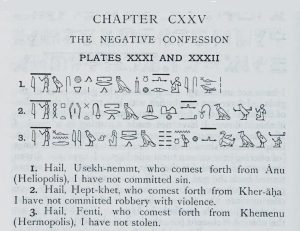 Sir Wallis Budge (curator of Egyptian and Assyrian antiquities at the British Museum, London, from 1894-1924) in his 1895 book, The Book of the Dead: The Hieroglyphic Transcript of the Papyrus of Ani [see above] included an early translation [listed below] of one version of the Laws of Maat.
Sir Wallis Budge (curator of Egyptian and Assyrian antiquities at the British Museum, London, from 1894-1924) in his 1895 book, The Book of the Dead: The Hieroglyphic Transcript of the Papyrus of Ani [see above] included an early translation [listed below] of one version of the Laws of Maat.
The ancient Egyptian goddess Maat and her laws personified a philosophy of truth, balance, order, harmony, law, morality and justice. Opposite Maat was Isfet (a philosophy personified in the god Apep), representing injustice, chaos, violence and the doing of evil. The Laws of Maat were known as “The Negative Confession” and were recited by individuals declaring innocence of Isfet.
One by one, a confessor recited Maat’s 42 laws. Though having a collective core, those laws were often customized for a given confessor. Each law first addresses one of the gods or goddesses in an imagined Hall of Truth — or Hall of Maat — before declaring innocence of lawbreaking, preceded by the words “I have not.” [Early English translations deployed “I have not” language most, but not all, of the time.]
“I have not” is followed by an offense of which the confessor declares innocence. Some versions of the Laws of the Maat repeated certain confessions more than once [see #s 5/39, 17/31 and 20/21 below].
There are also multiple variations of the Ten Commandments: Exodus 20, Exodus 34 and Deuteronomy 5. The Exodus 20 and Deuteronomy 5 Ten Commandments accounts borrow the goddess Maat’s “negative” confessional structure, slightly modifying the wording to “Thou shalt not” in the King James English translation of the Bible.
In addition, and based on Budge’s 1895 translation, at least 25 of Maat’s laws — numbers 1-11, 13, 15, 18, 20, 21, 24, 26, 31, 34, 37-39, 41 and 42 noted below — comprise six of the biblical commandments in Protestant versions of both Exodus 20 and Deuteronomy 5 [the third and sixth-10th commandments].
The Laws of Maat (from Budge, 1895)
1. I have not done iniquity.
2. I have not robbed with violence.
3. I have not stolen.
4. I have done no murder; I have done no harm.
5. I have not defrauded offerings [to god].
6. I have not made minished [diminished or stolen] oblations [offerings to god].
7. I have not plundered the god.
8. I have not spoken on lies.
9. I have not snatched away food.
10. I have not caused pain [“uttered curses” in later translations].
11. I have not committed fornication [or adultery].
12. I have not caused the shedding of tears.
13. I have not dealt deceitfully.
14. I have not transgressed.
15. I have not acted guilefully.
16. I have not laid waste the ploughed land.
17. I have not been an eavesdropper.
18. I have not set my lips in motion [lied] [against any man].
19. I have not been angry and wrathful except for a just cause.
20. I have not defiled the wife of any man.
21. I have not defiled the wife of any man.
22. I have not polluted myself.
23. I have not caused terror.
24. I have not transgressed [disobeyed the law].
25. I have not burned with rage.
26. I have not stopped my ears against the words of Right and Truth.
27. I have not worked grief.
28. I have not acted with insolence.
29. I have not stirred up strife.
30. I have not judged hastily.
31. I have not been an eavesdropper.
32. I have not multiplied words exceedingly.
33. I have done neither harm nor ill.
34. I have never cursed the king
35. I have never fouled the water.
36. I have not spoken scornfully.
37. I have never cursed God.
38. I have not stolen.
39. I have not defrauded the offerings of the gods.
40. I have not plundered the offerings of the blessed dead.
41. I have not filched the food of an infant, neither have I sinned against the god of my native town.
42. I have not slaughtered with evil intent the cattle of the god.